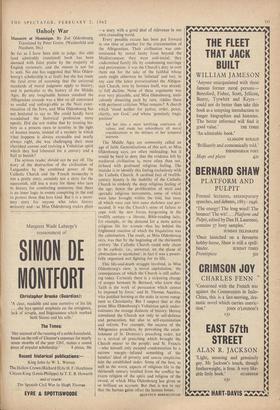Unholy War
So far as I have been able to judge, this able (and admirably translated) book has been damned with faint praise by the majority of English reviewers; and the reason is not far to seek. No one has suggested that Miss Olden- bourg's scholarship is at fault; but she has made the fatal error of assuming that the universal standards of moral judgment apply to history, and in particular to the history of the Middle Ages. By any imaginable human standard the Albigensian crusade was a blot on all concerned as sordid and unforgivable as the Nazi exter- mination of the Jews, and Miss Oldenbourg has not hesitated to say so. She could hardly have scandalised the historical profession more openly. Did she not realise that by treating his- tory as a process open to scrutiny in the light of human`reason, instead of a mystery in which what happens is always excusable and nearly always right, she was challenging their most cherished canons and reviving a Voltairian spirit which they had laboured for a century and a half to banish?
The serious reader should not be put off. The story of the destruction of the civilisation of Languedoc by the combined power of the Catholic Church and the French monarchy is not a pretty story, certainly not a story for the squeamish, still less a story for those who turn to history for comforting testimony that there is an inner logic in events conspiring in the end to protect those that love God. But it is a neces- sary story for anyone who takes history seriously and—as Miss Oldenbourg makes plain
—a story with a good deal of relevance in our own crusading world.
Every possible excuse has been put forward at one time or another for the extermination of the Albigensians. Their civilisation was con- taminated by moral laxity from beyond the Mediterranean; they were anti-social; they undermined family life by condemning marriage and procreation; it was the Church's duty to root them out for the sake of the faithful whose souls might otherwise be 'infected' and lost; in any case (the latest prevarication) the Albigen- sian Church, torn by heresies itself, was already in full decline. None of these arguments was ever very plausible, and. Miss Oldenbourg, meti- culously dissecting each by turn, riddles them with pertinent criticism. What remains? A church which 'stood neither for justice, order, peace. charity, nor God,' and whose 'genuinely tragic position'
led her into a most terrifying confusion of values, and made her subordinate all moral considerations to the defence of her temporal interests.
The Middle Ages are commonly called an age of faith. Generalisations of this sort, as Miss Oldenbourg says, are often misleading; but it would be hard to deny that the evidence left by mediteval civilisation is, more often than not, imbued with profound religious feeling. The mistake is to identify this feeling exclusively with the Catholic Church. A cardinal fact of twelfth- century history is the inability of the Catholic Church to embody the deep religious feeling of the age; hence the proliferation of sects and sporadic religious movements, some of which were later brought within the fold, but most of which were cast into outer darkness and per- secuted. It was the Church's sense of failure to cope with the new forces burgeoning in the twelfth century—a literate, Bible-reading laity, for example, or the demand for a more active religious life for women—that lay behind the frightened reaction of which the Inquisition was the culmination. The result, as Miss Oldenbourg says, was that by the beginning of the thirteenth century 'the Catholic Church could only claim to be catholic, i.e., universal, on the plane of abstraction or mysticism'; in fact it was a power- fully organised sect fighting for its life.
This life-and-death struggle involved, in Miss Oldenbourg's view, 'a moral capitulation,' the consequences of which the Church is still suffer- ing today. Certainly there is a sickening change of temper between St. Bernard, who knew that 'faith is the work of persuasion which cannot be imposed by force,' and St. Thomas Aquinas, who justified burning at the stake in terms repug- nant to Christianity. But I suspect that at this point Miss Oldenbourg's Voltairian spirit under- estimates the strange dialectic of history. Heresy stimulated the Church not only to self-defence and persecution, but also to self-examination and reform. For example, the success of the Albigensian preachers, by provoking the estab- lishment of St. Dominic's preaching order, led to a revival of preaching which brought the Church nearer to the people; and St. Francis --who himself only escaped condemnation by a narrow margin—infused something of the heretics' ideal of poverty and sancta simplicitas into the established order. Some of the best, as well as the worst, aspects of religious life in the thirteenth century resulted from the conflict be- tween religion of the spirit and religion of the sword, of which Miss Oldenbourg has given us so brilliant an account. But that is not to say that the human gains offset the human losses.
GEOFFREY( BARRACLOUGH


































 Previous page
Previous page